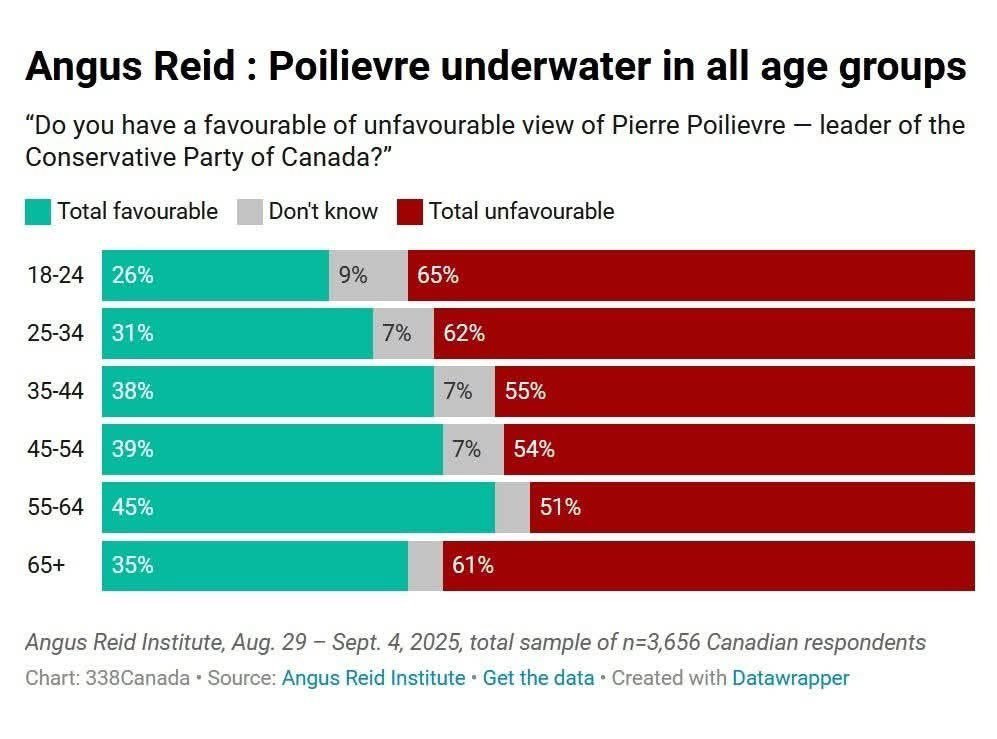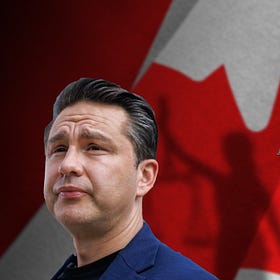Burning Bridges, Not Building Policy: Why Canadians Don’t Trust the CPC to Govern
10 Years of Conservative Performative Politics Have Left Canada Without a Government‑in‑Waiting
In recent weeks, Poilievre’s latest stunt was a call to scrap the Temporary Foreign Workers (TFW) Program—an idea immediately condemned as disastrous by business groups including the Canadian Federation of Independent Business, the Canadian Chamber of Commerce, and the Canadian Agricultural Human Resource Council. 12
To be clear, no one is claiming the TFW program is perfect, but instead of proposing reforms or realistic alternatives, Poilievre unabashedly suggested tossing the whole thing out the window.
And that’s the CPC in a nutshell: rather than do the work of constructive opposition, they double down on divisive rhetoric because they think it sells.
In reality, this performative rage does nothing to help Canadian businesses, workers, or the country as a whole. It’s the perfect example of today’s CPC: rage first, think later.
And this isn’t new behaviour. For ten years, Canadians have been stuck with an opposition that prefers rage farming over responsibility—and it shows. You can dislike the Liberals and still see the other half of the problem: Canada hasn’t had a serious Official Opposition for a decade.
A real opposition sharpens policy, proposes workable alternatives, and looks like a cabinet in training. What we’ve had instead is a party that treats Parliament like a stage, stokes division for clicks, and imports bad ideas from south of the border.
That isn’t accountability, and it’s sure not government—it’s more like slapstick theatre, chaotic for the sake of spectacle and empty of solutions.
The job description they keep skipping
A credible Official Opposition should do four things well:
Offer sane alternatives to government policy—evidence-based, with costing and numbers to back them up.
Improve legislation in committee rather than blowing it up for viral clips.
Model responsible governance so Canadians can see a government-in-waiting instead of manufactured outrage.
Look outward to what works in other successful democracies, not inward to rage cycles or outward to U.S. culture wars.
On this, the Conservatives have flunked the course for ten straight years. That decade wasn’t merely “lost by” the Liberals; it was lost to the Liberals because the CPC didn’t give Canadians a hopeful, competent Plan B.
Stop copying Washington: the U.S. playbook is failing there too
If you want to govern Canada, stop trying to import literally the worst American policy experiments.
Temporary Foreign Workers: scapegoat politics
Poilievre’s call to scrap Canada’s Temporary Foreign Workers Program would be disastrous, cutting off businesses from essential labour and stripping vulnerable foreign workers of legal protections. Business groups including CFIB, the Canadian Chamber of Commerce, and CAHRC warned this would harm both employers and workers. It’s a page ripped from the U.S. playbook of radical immigration politics, not a serious economic proposal.Guns and “castle-doctrine-esque” rhetoric
Floating U.S.-style “stand your ground” vibes may thrill a base, but these laws have been associated with increases in violent deaths and do nothing to solve Canada’s primary gun problem: smuggling and criminal trafficking.3 A real alternative would double down on border interdiction, straw-purchase crackdowns, community-level prevention, and targeted bail and parole enforcement for repeat violent offenders—without turning every confrontation into a legally sanctioned shootout.“Three strikes” and mandatory minimums
Jurisdictions in the U.S. are rolling these back for a reason: perverse outcomes, bloated costs, and little durable public-safety benefit.4 The core issue is stripping situational discretion from judges. Canada needs evidence-based sentencing that targets serious repeat violence while preserving judicial judgment in the hard, messy cases that statutes can’t foresee.Poilievre’s Imported Politics: Castle Laws and the “Three Strikes” Fantasy
·Poilievre’s latest hard‑edged policy push might look like he is still on the campaign trail. And in a sense he is, but it isn’t the campaign for a general election.
The “everything woke is bad” reflex
Turning a small development file into a gender-culture panic—like sneering at “gender-positive rice” funding in Vietnam—doesn’t make Canada safer or richer. It’s basic trade and development practice: support women’s rights and participation in supply chains so partner economies become more stable and more aligned with Canadian values.5 That’s not “culture war.” It’s good, boring statecraft.Climate: shrug, sneer, repeat
The current Conservative line—Canada’s emissions share is small, so why bother—confuses share with responsibility. Our trading partners are moving to price carbon, decarbonize industry, and align supply chains.6 A grown-up conservative climate plan would use market tools, technology incentives, carbon border adjustments, nuclear build-out, and clean-industrial contracts—then get out of the way and let firms invest.
Parliament as theatre, taxpayers as props
There is a difference between hardball and self-harm. The committee-disruption playbook—endless points of order, walkouts, witness sandbagging—is not scrutiny; it’s sabotage. The December 2023 30-plus-hour vote marathon that forced more than a hundred recorded votes, some on $1 line items, cost Canadians time and money and changed nothing.7 The same with using amendment stunts to hobble clean-water legislation for First Nations: it may “own the Libs,” but it does not deliver potable water.8 A real opposition would have demanded tighter timelines, enforceable standards, and transparent funding—then taken the win for Indigenous communities.
Sidebar: The Conservative Committee Playbook
Internal documents and accounts from Ottawa insiders have shown that the CPC approaches committees not as places to improve legislation but as stages for disruption. The playbook includes:
Forcing repeated points of order to eat up time.
Walking out to break quorum and stall hearings.
Flooding witnesses with irrelevant or hostile questions.
Demanding roll‑call votes on minor procedural items.
Using filibusters to drag out routine business for days.
The goal is simple: generate clips, block progress, and frame Parliament itself as dysfunctional. It is disruption by design, not scrutiny.
Why this keeps losing: Canadians want hope, not heat
Most Canadians live in the broad middle. They want lower bills, more housing, safer streets, predictable rules, and a livable climate. They also want to believe that tomorrow can be better. A party that forever foments division, targets journalists, litigates culture war after culture war, and looks to Washington for templates doesn’t read as a government-in-waiting. It reads as a rage franchise.
If you can’t picture them negotiating a trilateral supply-chain deal, landing a provincial health accord, or steering an industrial policy that survives a G7 peer review, you won’t hand them the keys. That’s the chief reason the CPC isn’t closing the deal: no credible blueprint, no hope.
What a serious conservative alternative would look like (today)
If the Conservatives truly want to govern, here’s the grown-up lane:
Housing: National-provincial compacts that trade transit and infrastructure dollars for by-right density, faster permitting clocks, and standardized code adoptions.
Productivity: A single, simpler R&D credit that rewards commercialization, plus modernized competition law and predictable regulatory service-standards.
Public safety: Target gangs and gun-trafficking with integrated border/CBSA/RCMP teams, fix data-sharing, and reserve the harshest penalties for violent repeat offenders—while keeping judicial discretion intact.
Climate and energy: Technology-neutral tax credits, small-modular nuclear, CCUS where it truly abates, clean-hydrogen offtake contracts, and a carbon-border regime aligned with key trading partners.
Health and human capital: Fund outcomes (primary-care attachment, surgery backlogs) rather than inputs alone; expand apprenticeships and fast-track credential recognition to close labour gaps.
You know—policy.
Leadership and the tactics problem
The tone at the top still matters. Pierre Poilievre’s one undisputed mastery is provocation. It moves merch and hardens loyalties, but it does not build coalitions or solve national problems. The CPC has fallen into a feedback loop, mistaking loud reactions from its base for broad electability. The tone Poilievre brings isn’t expanding his appeal—it’s narrowing it.

Jenni Byrne, a longtime Conservative strategist, former Harper adviser, and campaign manager for Poilieve was at the centre of controversy during the last election when campaign choices and the failure to pivot were widely panned by prominent Conservative voices. Whether she has truly stepped back or those campaign choices were Poilievre’s all along, the tactics haven’t changed: fight first, think later.
That approach cost them a commanding lead and, more importantly, any claim to be the adults in the room.
The bottom line
Canada doesn’t need a pyromaniac at the firehall. It needs an Official Opposition that stops trying to burn the place down and starts doing the unglamorous work of proposing sane alternatives—so Canadians can actually imagine them forming government.
Until the Conservatives drop the imported culture wars, quit the committee circus, and put forward detailed, internationally literate policy, the decade will keep being lost to the Liberals. Not because the Liberals are unbeatable, but because the CPC keeps refusing to look like a government-in-waiting.
Canadians are ready to reward competence. The question is whether the Conservatives are ready to offer it.
Sources
Canadian Federation of Independent Business (CFIB) – Statement on Temporary Foreign Workers Program.
https://www.cfib-fcei.ca/en/media/news-releases/cfib-statement-on-temporary-foreign-workers-program
Canadian Chamber of Commerce & Canadian Agricultural Human Resource Council – Reaction to TFW comments.
https://chamber.ca/news/chamber-cahrc-response-to-tfw-proposal
RAND Corporation – Analysis of Stand Your Ground laws and violent crime.
https://www.rand.org/research/gun-policy/analysis/stand-your-ground.html
Brennan Center for Justice – Review of Three Strikes laws in the U.S.
https://www.brennancenter.org/our-work/research-reports/three-strikes-laws-facts
Global Affairs Canada – Gender equality in trade and development programs.
https://www.international.gc.ca/world-monde/issues_development-enjeux_developpement/gender_equality-egalite_des_genres.aspx
International Energy Agency – Carbon pricing and border adjustment mechanisms.
https://www.iea.org/reports/carbon-pricing-and-border-adjustments
iPolitics – Report on December 2023 Conservative filibuster vote marathon.
https://www.ipolitics.ca/news/conservative-filibuster-ends-after-voting-marathon
North Shore News – Chief’s comments on Conservatives blocking Bill C-61 (Clean Water Act for First Nations).
https://www.nsnews.com/indigenous-news/chief-disappointed-to-see-clean-water-used-as-political-tactic-9914062






